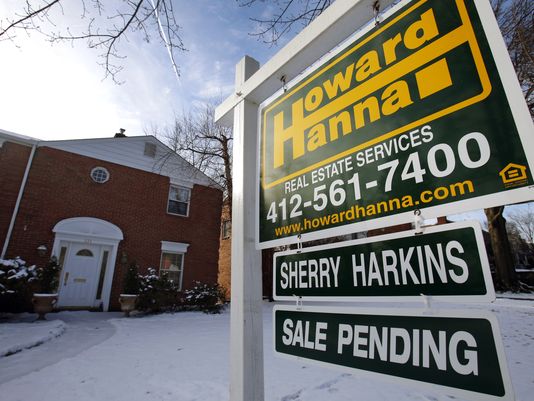3 reasons not to buy a home now
HTTP/1.1 200 OK Server: nginx/1.2.7 Content-Type: text/html; charset=utf-8 Content-Language: en Last-Modified: Sat, 14 Jun 2014 15:15:28 GMT X-UA-Compatible: IE=Edge,chrome=1 X-Secret: cnpudnkgcnpiZXZnbUBoZm5nYnFubC5wYnogbmFxIFYganZ5eSBnZWwgZ2IgdHJnIGxiaCBuIHdiby4= Cache-Control: max-age=20 Expires: Sat, 14 Jun 2014 15:18:33 GMT Date: Sat, 14 Jun 2014 15:18:13 GMT Transfer-Encoding: chunked Connection: keep-alive Connection: Transfer-Encoding
If you're thinking about buying a home, now may seem like a tempting time to finally take the plunge. Mortgage rates are the lowest they've been in a year, and we keep hearing that rates are expected to rise over the next several years.
However, there are a few reasons you might not want to buy a house this summer.
Don't buy when everyone else is
According to realtor.com, the spring and summer months are the best time to sell a home, because that's when the most buyers are in the market.
Families like to move when their kids aren't in school, and it is just more convenient to move in nice weather than in frigid winter weather. In fact, about 50% of all home sales take place during the summer alone.
Like with any investment or purchase, buying when everyone else wants to buy is rarely the best idea. Sellers generally see more activity during the summer, which means more offers and the ability to hold out for the price they really want.
Realtor.com also says winter is the least favorable time of year for sellers. Generally, those sellers who put their homes on the market in the winter are more eager to move, and are more willing to make deals. As a buyer, the lower demand also means you'll get more personal attention from professionals like real estate agents, home inspectors, and closing attorneys, making the whole process easier and more pleasant.
How's your credit?
While lending standards have loosened a bit since the mortgage crisis ended, they are still very tight on a historical basis.
It's true that you can qualify for an FHA loan with less-than-perfect credit, but that's not always a good idea. An FHA loan might even be much more expensive than renting a similar home, but I'll discuss that in more detail shortly.
In order to qualify for good interest rates on a conventional loan, you'll need a FICO score of 700 or above. Below that level, it becomes much more expensive to borrow. For instance, a score of 720 (considered to be very good) should get you a 30-year rate of about 3.99% as of this writing, but a 650 will cause the rate to jump to around 4.81%, according to myfico.com. On a $200,000 mortgage, this is the difference between monthly payments of $954 and $1,051.
If you have a credit score that's not excellent, your best bet may be to focus your efforts on improving your credit. If you can save a few hundred dollars a month by waiting until your credit score is a little better, it could make more sense to rent for the time being.
For information on improving your FICO score (the one most lenders use), there is a guide on the myfico.com website that provides details of what makes up your score and how to improve it.
If you don't have enough cash, don't buy
Unless you have a pretty good stockpile of cash to put toward your home, buying might be a lot more expensive than you think.
There are some low down payment options out there, mainly FHA loans, but they come at a cost. And now may be a bad time to get in, since the costs associated with FHA loans are pretty high and can increase further at any time.
Currently, to get an FHA loan, you have to pay both an upfront mortgage insurance premium and monthly payments. You used to be able to drop the monthly mortgage insurance payments after reaching a loan-to-value ratio of 78%, but now must be paid for the life of the loan if you put 10% or less down. The upfront mortgage payment costs 1.75% of the loan amount and an annual premium of up to 1.35% of the loan amount is added to your monthly payments.
So, on a $200,000 loan, you can add $3,500 to your closing costs and $225 to every monthly payment. That's not to mention the loan itself will have a higher balance if you only put a small amount down. Depending on how small your down payment is, you could easily pay $500 extra per month versus a conventional loan for the exact same house.
The bottom line is, if you don't have 20% to put down on a home, you're probably better off renting for now and saving as much as you can.
In a nutshell
Your house will probably be the largest purchase of your life, so it's important to wait for the best time to buy.
While nobody has a crystal ball that tells us what the housing market will do, it's easy to see how you might want to wait for fewer buyers to compete with, more cash to put down, and better credit to make your mortgage cheaper and easier to get. It makes the most sense to buy a house if it's cheaper than rent would be, and if you get these three parts of the buying process right it certainly should be.
The Motley Fool is a USA TODAY content partner offering financial news, analysis and commentary designed to help people take control of their financial lives. Its content is produced independently of USA TODAY.
Read or Share this story: http://usat.ly/1pX2vQ0










